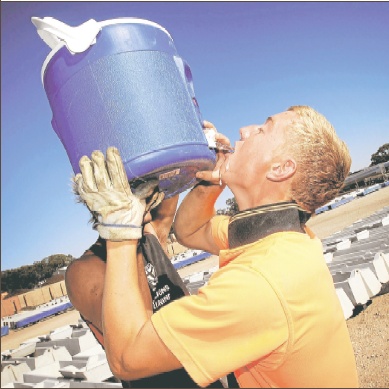Study heats up on people burning to work in NT
 Anyone who has seen the news or been outside recently will know that Australia is experiencing a hot flush.
Anyone who has seen the news or been outside recently will know that Australia is experiencing a hot flush.
Dark patches of sweat and an omnipresent water bottle will be the accessories of the summer for many workers, but a new study seeks to find out just how bad the heat can be for people on the job.
Record levels of heat and humidity have hit the Top End of the Northern Territory, and will now be the focus of a Charles Darwin University (CDU) project looking at the impacts of heat stress on labour-intensive industries.
The aim is to improve work-related heat stress management strategies in the Northern Territory and across the country. The study will be performed in collaboration with authorities from the National Critical Care and Trauma Response Centre (NCCTRC).
“The impact of humid heat on productivity, wellbeing and safety of workers is commonly recognised in the NT,” CDU’s Dr Elspeth Oppermann says.
“What isn’t clear is the degree of physiological and social impacts, in conjunction with job-specific or site-specific practices, and what this could mean for industry and workers in the NT.”
Dr Oppermann will work with Dr Matt Brearley, from the NCCTRC, to build on the group’s already advanced heat stress studies. They will monitor individual core-temperatures in real-time and link the figures to physical workloads and environmental conditions.
“It is the sort of monitoring previously reserved for elite athletes to improve performance and win medals,” Dr Brearley said.
“In the NT, those working in labour-intensive industries are periodically exposed to hot conditions and can experience similar types of physical stress, making them ‘industrial athletes’.
“The NCCTRC has done similar monitoring with emergency services staff and we are translating this methodology to assist industry with heat stress management strategies.”
“Through the integration of medical and social analysis we hope to generate a strong evidence base for organisational interventions to improve heat stress management,” Dr Oppermann says.
“The workforce of the NT is very transient. I will be speaking to staff about how they make their day-to-day choices about dealing with heat stress. And if they are not from the NT, we will be interested to know how they have learned to deal with heat stress and what beliefs or norms shape their behaviours.”







 Print
Print